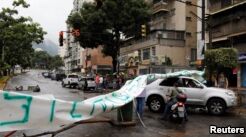正文
Opposition Strike Halts Business in Venezuela
A national strike called by Venezuela’s opposition Thursday brought much of the country to a halt.
Opponents of President Nicolas Maduro called the 24-hour strike. The opposition groups want to show national disapproval for Maduro’s plan to rewrite Venezuela’s constitution.
It was the first major strike in Venezuela since 2002, when the opposition tried unsuccessfully to oust former president Hugo Chavez.
The action appeared to have stopped nearly all bus traffic across the capital, Caracas. Many private businesses were closed even though the government demanded that they stay open.

Government-run companies remained open. But some had limited services because many employees did not show up for work.
Some people noted that the opposition action would cost them money at a time of extreme economic crisis and food shortages. Many others said it was important to show support for the cause.
Several groups set up roadblocks in areas across Caracas to show opposition to Maduro’s rule.
A collection of groups oppose Maduro’s proposal to create a new legislative body to rewrite the country’s 1999 constitution. It would also have the power to dissolve state institutions. Maduro has set a July 30 vote to create the body.
The opposition has accused Maduro of seeking to build up the proposed new legislature with his supporters. They say this would permit him to remove the few remaining checks on his power and create a Cuba-style system controlled by his socialist party.
The opposition wants the military to defend the current constitution. It has also demanded new elections before Maduro’s term ends in early 2019.
The strike came after more than seven million Venezuelans voted last weekend in an unofficial referendum. In the opposition-organized vote, 98 percent rejected Maduro’s proposal to rewrite the constitution.
The referendum was seen as symbolic because it was not part of an official government election. Maduro dismissed the voting as unconstitutional. He said it would have no effect on the government or his proposals.
On Monday, American President Donald Trump also spoke against the proposal. In a statement, Trump said, “If the Maduro regime imposes its Constituent Assembly on July 30, the United States will take strong and swift economic actions.”
Anti-government unrest over the past four months has left almost 100 people dead and 1,500 injured.
I’m Bryan Lynn.
Bryan Lynn adapted this story for VOA Learning English, based on reports from the Associated Press and Reuters. Hai Do was the editor.
We want to hear from you. Write to us in the Comments section, and visit our www.hxen.net .
相关文章
- Brazilian Painter Brings Attention to Threatened Amazon Rainforest
- Chinese Parents Praise Rule Limiting Video Game Time
- Pfizer Says COVID-19 Vaccine Safe for Children 5-11
- Former Diplomat Likely to Become Japan’s Next Prime Minister
- Two Americans Win Nobel Medicine Prize for Body Sensory Findings
- Creators of Molecule Building Tool Win Nobel Prize in Chemistry
- Japan’s Princess Mako Goes Ahead with Marriage Plans
- Solar Panels Help French Winemaker Deal with Climate Change
- S. Korea Launches Group to Debate ‘Living with COVID-19’
- This Ain't It和其他简短的形式




 手机网站
手机网站